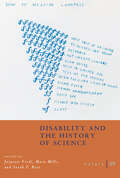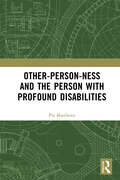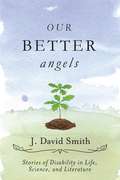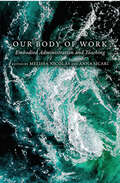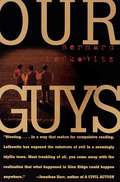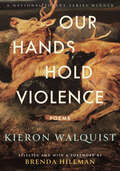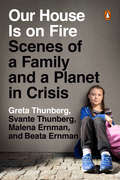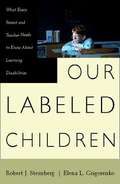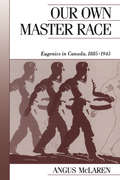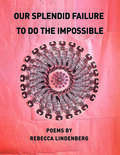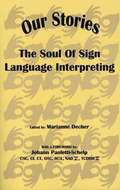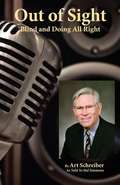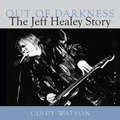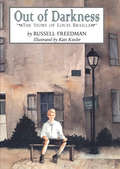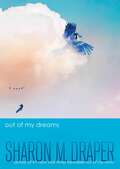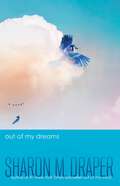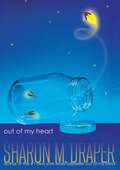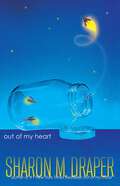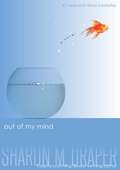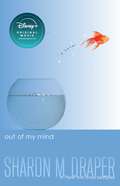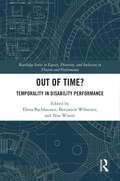- Table View
- List View
Osiris, Volume 39: Disability and the History of Science (Osiris #39)
by The University of Chicago PressPresents a powerful new vision of the history of science through the lens of disability studies. Disability has been a central—if unacknowledged—force in the history of science, as in the scientific disciplines. Across historical epistemology and laboratory research, disability has been “good to think with”: an object of investigation made to yield generalizable truths. Yet disability is rarely imagined to be the source of expertise, especially the kind of expertise that produces (rational, neutral, universal) scientific knowledge. This volume of Osiris places disability history and the history of science in conversation to foreground disability epistemologies, disabled scientists, and disability sciencing (engagement with scientific tools and processes). Looking beyond paradigms of medicalization and industrialization, the volume authors also examine knowledge production about disability from the ancient world to the present in fields ranging from mathematics to the social sciences, resulting in groundbreaking histories of taken-for-granted terms such as impairment, infirmity, epidemics, and shōgai. Some contributors trace the disabling impacts of scientific theories and practices in the contexts of war, factory labor, insurance, and colonialism; others excavate racial and settler ableism in the history of scientific facts, protocols, and collections; still others query the boundaries between scientific, lay, and disability expertise. Contending that disability alters method, authors bring new sources and interpretation techniques to the history of science, overturn familiar narratives, apply disability analyses to established terms and archives, and discuss accessibility issues for disabled historians. The resulting volume announces a disability history of science.
Other-person-ness and the Person with Profound Disabilities
by Pia MatthewsMany people think that profound disability presents us with a real problem, often because it seems difficult to connect with someone who does not seem to think or act like us. Positioning profound disability in this way immediately sets up a ‘them’ and ‘us’, where the person with profound disability becomes the problematic ‘other’. Attempts to bridge the ‘them’ and ‘us’ risk reducing everyone to the same where disability is not taken seriously.In contrast to a ‘them’ and ‘us’, and negative connotations of the other found in the existentialist philosophies of writers like Sartre and Beauvoir, Pia Matthews argues for a return to a positive view of the other. One positive approach to the other, based on an ethics of relationship as championed by Levinas, seems to mitigate the other-ness of profound disability. However, this still makes the person with profound disability dependent on the ethical concern of the more powerful other. Instead, this book argues for return to a personalist philosophy of being offered by Mounier, Marcel, and Wojtyła, and deepened by participation, belonging, and the possibility of contributing to the good of all. This deepened philosophy of being gives a more solid foundation for people who are especially at the mercy of others. It will be of interest to all scholars and students of disability studies, philosophy and anthropology.
Our Better Angels: Stories of Disability in Life, Science, and Literature
by J David SmithDo children and adults with disabilities enrich our lives? Far more than most people imagine.Our Better Angels is a testament to the value of individuals with disabilities and the value that society could derive from being more welcoming to and inclusive of them. The reward is the powerful humanizing influence that they can have on others-even some of the most hardened people among us.Colorful, real-life examples illustrate how a disability can be a valuable human attribute, a powerful source of compassion from which everyone can benefit.What are the challenges that face us as we strive for a more inclusive society? What are the values that should guide us in our efforts? Smith approaches these questions by examining his own experience and other unique perspectives: Meet the children and adults with disabilities who have touched his own life Consider what science-and pseudoscience-has said about disability View disability through the lens of history and literatureThe result is a compelling case for understanding and celebrating human diversity. Smith asks us to summon the "better angels" of our character and affirm our commitment to a society based on equality and democracy.
Our Body of Work: Embodied Administration and Teaching
by Melissa Nicolas Anna SicariOur Body of Work invites administrators and teachers to consider how physical bodies inform everyday work and labor as well as research and administrative practices in writing programs. Combining academic and personal essays from a wide array of voices, it opens a meaningful discussion about the physicality of bodily experiences in the academy. Open exchanges enable complex and nuanced conversations about intersectionality and how racism, sexism, classism, and ableism (among other “isms”) create systems of power. Contributors examine how these conversations are framed around work, practices, policies, and research and identify ways to create inclusive, embodied practices in writing programs and classrooms. The collection is organized to maximize representation in the areas of race, gender, identity, ability, and class by featuring scholarly chapters followed by narratively focused interchapters that respond to and engage with the scholarly work. The honest and emotionally powerful stories in Our Body of Work expose problematic and normalizing policies, practices, and procedures and offer diverse theories and methodologies that provide multiple paths for individuals to follow to make the academy more inclusive and welcoming for all bodies. It will be an important resource for researchers, as well a valuable addition to graduate and undergraduate syllabi on embodiment, writing instruction/pedagogy, and WPA work. Contributors: Dena Arendall, Janel Atlas, Hayat Bedaiwi, Elizabeth Boquet, Lauren Brentnell, Triauna Carey, Denise Comer, Joshua Daniel, Michael Faris, Rebecca Gerdes-McClain, Morgan Gross, Nabila Hijazi, Jacquelyn Hoermann-Elliott, Maureen Johnson, Jasmine Kar Tang, Elitza Kotzeva, Michelle LaFrance, Jasmine Lee, Lynn C. Lewis, Mary Lourdes Silva, Rita Malenczyk, Anna Rita Napoleone, Julie Prebel, Rebecca Rodriguez Carey, Ryan Skinnell, Trixie Smith, Stacey Waite, Kelsey Walker, Shannon Walters, Isaac Wang, Jennie Young
Our Guys: The Glen Ridge Rape and the Secret Life of the Perfect Suburb
by Bernard LefkowitzIn March 1989 a group of teenage boys lured a retarded girl into a basement in Glen Ridge, New Jersey, and gang-raped her. Glen Ridge was the kind of peaceful, affluent suburb many Americans dream about. The rapists were its most popular high school athletes. And although rumors of the crime quickly spread through the town, weeks passed before anyone saw fit to report it to the police. What made these boys capable of brutalizing a girl that some of them had known since childhood? Why did so many of their elders deny the rape and rally around its perpetrators? To solve this riddle, the Edgar award-winning author Bernard Lefkowitz conducted years of research and more than two hundred interviews. The result is not just a wrenching story of crime and punishment, but a hauntingly nuanced portrait of America's jock culture and the hidden world of unrestrained adolescent sexuality.
Our Hands Hold Violence: Poems
by Kieron WalquistA NATIONAL POETRY SERIES WINNER SELECTED AND WITH A FOREWORD BY BRENDA HILLMAN A collection of poems that explores rural Missouri, violence, queer desire / intimacy, addiction, familial and wildlife relationshipsThrough encounters with the everyday beauty and brutality so much a part of rural and urban Missouri, Our Hands Hold Violence explores what it means to experience and/or perpetuate small and significant acts of violence, toward others and the self.What does it mean to hunt (be hunted), haunt (be haunted), and other (be othered)? Abiding by a chronological arc told in four movements (HERE, THERE, TOGETHER, ALONE), OHHV follows the speaker(s) as they come up in the Show Me State and come to terms with queerness, mental disability, addiction, and loneliness in the largely Christian, conservative, and hyper-masculine landscape. Other themes / aspects of note include familial dynamics, estrangement, labor, neglected and decaying natures, waste, and the confluence of wildlife and mankind.Comprised of traditional forms and modes such as the abecedarian, ekphrasis, sestina, and more hybrid configurations (billboards, bullet points, McDonald&’s Monopoly stickers), as well as photographs, OHHV is interested, too, in changing/challenging structure and expectations. Thus, enacting a visual and figurative &“violence&” upon the page. Additionally, two poems are contained in a nonce (invented) form called &“Shakes,&” where strophes traverse between left and right points, while the middle column is constructed or cataloged by similar sounds—a form inspired by the author&’s own reality of stimming (i.e. pacing) and echolalia.OHHV indulges in alliteration, assonance, repetition, and a colloquial registry of language. The voice(s) in the poems can range from anxious, reflective (nostalgic), sensual, and tender, but all are compelled by and circle the manuscript&’s themes, which become obsessions. Hauntings. Ultimately, OHHV is a collection troubled by the desire to belong to/in a place and to beloveds that have &“been home&” while, in ways, &“feeling like an outsider&” at home and within one&’s local community.
Our House Is on Fire: Scenes of a Family and a Planet in Crisis
by Greta Thunberg Malena Ernman Beata Ernman Svante Thunberg"A must-read ecological message of hope . . . Everyone with an interest in the future of this planet should read this book." --David Mitchell, The GuardianWhen climate activist Greta Thunberg was eleven, her parents Malena and Svante, and her little sister Beata, were facing a crisis in their own home. Greta had stopped eating and speaking, and her mother and father had reconfigured their lives to care for her. Desperate and searching for answers, her parents discovered what was at the heart of Greta&’s distress: her imperiled future on a rapidly heating planet. Steered by Greta&’s determination to understand the truth and generate change, they began to see the deep connections between their own suffering and the planet&’s. Written by a remarkable family and told through the voice of an iconoclastic mother, Our House Is on Fire is the story of how they fought their problems at home by taking global action. And it is the story of how Greta decided to go on strike from school, igniting a worldwide rebellion.
Our Labeled Children: What Every Parent and Teacher Needs to Know About Learning Disabilities
by Robert J. Sternberg Elena L. GrigorenkoSternberg and Grigorenko, both psychologists and researchers at Yale University, are concerned that the way learning disabilities are assessed and treated in American school systems is not consistent. They argue that everyone is learning disabled in something, but that society only chooses to recognize disabilities in certain areas. They also note that lumping all children labeled learning disabled into this one category actually harms most of the children because they do not all have the same needs. The authors suggest that instead of this one form of remediation, the schools should develop a system through which the needs of each child are met on an individualized basis.
Our Own Master Race
by Angus MclarenWas Canada immune to the racist currents of thought that swept central Europe in the 1920's and 1930's? In this landmark book Angus McLaren, co-author of The Bedroom and the State, examines the pervasiveness in Canada of the eugenic notion of "race betterment" and demonstrates that many Canadians believed that radical measures were justified to protect the community from the "degenerate." The sterilization of the feeble-minded in Alberta and British Columbia was merely the most dramatic attempt to limit the numbers of the "unfit." But in the decades prior to World War Two, eugenic preoccupations were to colour discussions of immigration restriction, birth control, mental testing, family allowances, and a host of similar social policies. Doctors, psychiatrists, geneticists, social workers, and mental hygienists provided an anxious Canadian middle class with the reassuring argument that poverty, crime, prostitution, and mental retardation were primarily the products of defective genes, not a defective social system. In explaining why biological solutions were sought for social problems McLaren not only provides a provocative reappraisal of the ideas and activities of a generation of feminists, political progressives, and public health propagandists but he also explores some of the roots of our not-so-latent racist tendencies.
Our Splendid Failure to Do the Impossible
by Rebecca LindenbergLiving in landscapes of ruin and ruination, memory and problematic nostalgia, Rebecca Lindenberg’s Our Splendid Failure to Do the Impossible plumbs the depths of disruption, decay, and how we go on when the world stops cold. Inspired by the speaker’s experiences of living with type 1 diabetes, the collection chronicles humanity’s daily fight for survival in a world that’s bent on destroying itself.Lindenberg centers love, self-acceptance, and intimacy as incomparable balms across great geographical and psychological distances, and asks the reader to do the impossible: hope.
Our Stories: The Soul Of Sign Language Interpreting
by Marianne DecherShort vignettes of real life sign language interpreting experiences that left a mark on interpreters' souls. Some pieces are funny, some serious. A few are written by Deaf and Deaf-Blind consumers.
Out Of Sight: Blind And Doing All Right
by Art Schreiber Hal SimmonsA high level radio news broadcast executive, Art Schreiber suddenly lost his eyesight. At the top of his career as a radio station general manager, Art awoke one morning at a resort near Santa Fe, New Mexico, unable to see. His world was in complete darkness. After facing total despair, Art plotted his return to the top while learning to live life in a new way in a new world. Art's refusal to fold his tent when his eyesight failed and his struggle to live life to the fullest will inspire any person who reads his story. Art's greatest reward in life is encouraging and motivating others who face similar challenges.
Out into the Big Wide Lake
by Paul HarbridgeAn empowering and necessary picture book about a young girl with Down syndrome who gains confidence and independence through a visit to her grandparents.It's Kate's first time visiting her grandparents on her own at their lakeside home. She's nervous but excited at the adventure ahead. She helps her grandfather with his grocery deliveries by boat, where she meets all the neighbors, including a very grumpy old man named Walter. And she makes best friends with her grandparents' dog, Parbuckle.Her grandmother even teaches her to pilot the boat all by herself! When her grandfather takes ill suddenly, it's up to Kate -- but can she really make all those deliveries, even to grumpy old Walter? She has to try!Based on the author's sister, Kate is a lovable, brave, smart and feisty character who will capture your heart in this gorgeous and moving story about facing fears and gaining independence.
Out of Control (Duncan Mclain Mystery #6)
by Baynard KendrickBlind or not, Captain Duncan Maclain saw through Marcia Filmore almost from the start. She was young, beautiful, and deadly--a criminal psychopath who would stop at nothing to protect her rich marriage. And so, when blackmailer Walter Crane turned up dead, it was only natural that Maclain should start feeling his way through the dark and devious maze that led to Marcia. But that lethal lady intended to protect herself--even if she had to kill again . . . and again . . . and again...
Out of Darkness: The Jeff Healey Story
by Cindy Watson<P>Short-listed for the 2011 Golden Oak Award <P>From the moment three-year-old Jeff Healey first laid a guitar across his lap in what was to become his signature style, it was clear he was no ordinary kid. <P>Losing both eyes to retinoblastoma, a rare form of cancer, opened a door to another world for Jeff, a newly adopted infant. <P>Out of darkness he created music, becoming one of the most influential blues-rock and jazz performers of our time, beginning with his first hit album, See the Light. <P> In this up-close and personal account, loaded with never-before-seen photographs, memorabilia, and intimate recollections of family, friends, and fellow musicians, we discover this unique music icon’s dynamic career, which saw him collaborate with everyone from George Harrison and Eric Clapton to B.B. King and Stevie Ray Vaughan. <P>From Jeff’s lonely start one snowy night at St. Joseph’s Hospital in Toronto to his untimely end in the same building, we come away with a potent message of empowerment and a renewed sense of hope.
Out of Darkness: The Story of Louis Braille
by Russell FreedmanA biography of the 19th century Frenchman who developed Braille. The book spans Braille's life from childhood through his days at the Royal Institute for Blind Youth and into his final years, when the alphabet he invented was finally gaining acceptance.
Out of My Dreams (The Out of My Mind Series)
by Sharon M. DraperMelody flies to London to speak at a convention about differently abled kids in this &“warm and beautifully told&” (Kirkus Reviews, starred review) sequel to the acclaimed, New York Times bestselling middle grade novels Out of My Mind and Out of My Heart.When Melody saves an elderly back-in-the-day actress&’s life, she ends up on their local TV channel. The studio is so impressed with Melody that they arrange for her to be a speaker at an international symposium for kids who are differently abled, and this year&’s symposium is in London! To Melody&’s utter shock and delight, her parents say yes. Yes! Melody finally gets to fly on an airplane, and many adventures in London await, including a cheeky interaction with a royal guard&’s horse, becoming a little too acquainted with old-timey armor, and a run in with one of the most popular pop stars on the planet! But the biggest adventure is the I.D.E.A. symposium. There, Melody meets kids from all over the world who are rallying for greater accessibility and more thoughtful planning on how to make the world more equal for every kid, no matter the challenges they face. But as Melody&’s time to speak approaches, big-time nerves set in: how can a girl who&’s never spoken a word out loud in her life give an entire speech?
Out of My Dreams (The Out of My Mind Series)
by Sharon M. DraperMelody flies to London to speak at a convention about differently abled kids in this &‘warm and beautifully told&’ (Kirkus Reviews, starred review) sequel to the acclaimed, New York Times bestselling middle grade novels Out of My Mind and Out of My Heart. Melody is electric with excitement. She did something very, very wonderful for someone who was very, very thankful. And now she&’s going on her first ever aeroplane flight . . . to London. Will her wheelchair make it there in one piece? Will she finally find a best friend to be silly with? Go on a heart-thumping adventure? Maybe even meet a prince? Will she be brave enough to give a speech . . . when she has never uttered a single word in her entire life? Will a dream of her own enable others to have dreams of their own? What Melody will discover is that some dreams can come true, sometimes in the most unexpected ways. This third book in the Out of My Mind trilogy sees dreams fulfilled . . . and new ones being dared to be dreamt of!
Out of My Heart (The Out of My Mind Series)
by Sharon M. DraperA New York Times bestseller! Melody faces her fears to follow her passion in this stunning sequel to the acclaimed, New York Times bestselling middle grade novel Out of My Mind.Melody, the huge-hearted heroine of Out of My Mind, is a year older, and a year braver. And now with her Medi-talker, she feels nothing&’s out of her reach, not even summer camp. There have to be camps for differently-abled kids like her, and she&’s going to sleuth one out. A place where she can trek through a forest, fly on a zip line, and even ride on a horse! A place where maybe she really can finally make a real friend, make her own decisions, and even do things on her own—the dream! By the light of flickering campfires and the power of thunderstorms, through the terror of unexpected creatures in cabins and the first sparkle of a crush, Melody&’s about to discover how brave and strong she really is.
Out of My Heart (The Out of My Mind Series)
by Sharon M. DraperA New York Times bestseller. Melody faces her fears to follow her passion in this stunning sequel to the acclaimed middle grade novel Out of My Mind. Melody, the huge-hearted heroine of Out of My Mind, is a year older and a year braver. And now with her Medi-talker, she feels nothing&’s out of her reach, not even summer camp. There have to be camps for kids like her, and she&’s going to sleuth one out – a place where she can trek through a forest, fly on a zip line and ride a horse. A place where maybe she can make her own decisions, do things herself, and maybe maybe maybe, finally make a true friend. By the light of flickering campfires and the power of thunderstorms, through the shock of unexpected creatures in cabins and the first sparkle of a crush, Melody&’s about to discover how brave and strong she truly is.
Out of My Mind (The Out of My Mind Series)
by Sharon M. DraperThis special movie tie-in edition showcases a new cover with an image from the original movie now available on Disney+! A New York Times bestseller for three years and counting! &“Unflinching and realistic.&” —Kirkus Reviews (starred review) From award-winning author Sharon Draper comes a &“gutsy, candid, and compelling&” (School Library Journal, starred review) story that will forever change how we all look at anyone with a disability, perfect for fans of RJ Palacio&’s Wonder.Eleven-year-old Melody is not like most people. She can&’t walk. She can&’t talk. She can&’t write. All because she has cerebral palsy. But she also has a photographic memory; she can remember every detail of everything she has ever experienced. She&’s the smartest kid in her whole school, but NO ONE knows it. Most people—her teachers, her doctors, her classmates—dismiss her as mentally challenged because she can&’t tell them otherwise. But Melody refuses to be defined by her disability. And she&’s determined to let everyone know it…somehow.
Out of My Mind (The Out of My Mind Series)
by Sharon M. DraperA New York Times bestseller and now an original film on Disney+! From award-winning author Sharon Draper comes a story that will forever change how we all look at anyone with a disability, perfect for fans of R. J. Palacio&’s Wonder. Eleven-year-old Melody has a photographic memory. Her head is like a video camera that is always recording. Always. And there's no delete button. She's the smartest kid in her whole school – but NO ONE knows it. Most people – her teachers and doctors included – don't think she's capable of learning, and up until recently her school days consisted of listening to the same preschool-level alphabet lessons again and again and again. If only she could speak up, if only she could tell people what she thinks and knows ... but she can't, because Melody can't talk. She can&’t walk. She can&’t write. Being stuck inside her head is making Melody go out of her mind – that is, until she discovers something that will allow her to speak for the first time ever. At last Melody has a voice ... but not everyone around her is ready to hear it. &‘A gutsy, candid, and compelling story. It speaks volumes.&’ School Library Journal (starred review) &‘Unflinching and realistic.&’ Kirkus Reviews (starred review)
Out of Time?: Temporality In Disability Performance (Routledge Series in Equity, Diversity, and Inclusion in Theatre and Performance)
by Elena BackhausenOut of Time? has many different meanings, amongst them outmoded, out of step, under time pressure, no time left, or simply delayed. In the disability context, it may also refer to resistant attitudes of living in “crip time” that contradict time as a linear process with a more or less predictable future. According to Alison Kafer, “crip time bends the clock to meet disabled bodies and minds.” What does this mean in the disability arts? What new concepts of accessibility, crip futures, and crip resistance can be staged or created by disability performance? And how does the notion of “out of time” connect crip time with pandemic time in disability performance? The collective volume seeks to respond to these questions by exploring crip time in disability performance as both a concept and a phenomenon. The book tackles the topic from two angles: on the one hand from a theoretical point of view that connects performance analysis with crip and performance theory, on the other hand from a practice-based perspective of disability artists who develop new concepts and dramaturgies of crip time based on their own lived experiences and observations in the field of the performing and disability arts. The book gathers different types of text genres, forms, and styles that mirror the diversity of their authors. Besides theoretical and academic chapters on disability performance, the book also includes essays, poems, dramatic texts, and choreographic concepts that ref lect upon the alternative knowledge in the disability arts.
